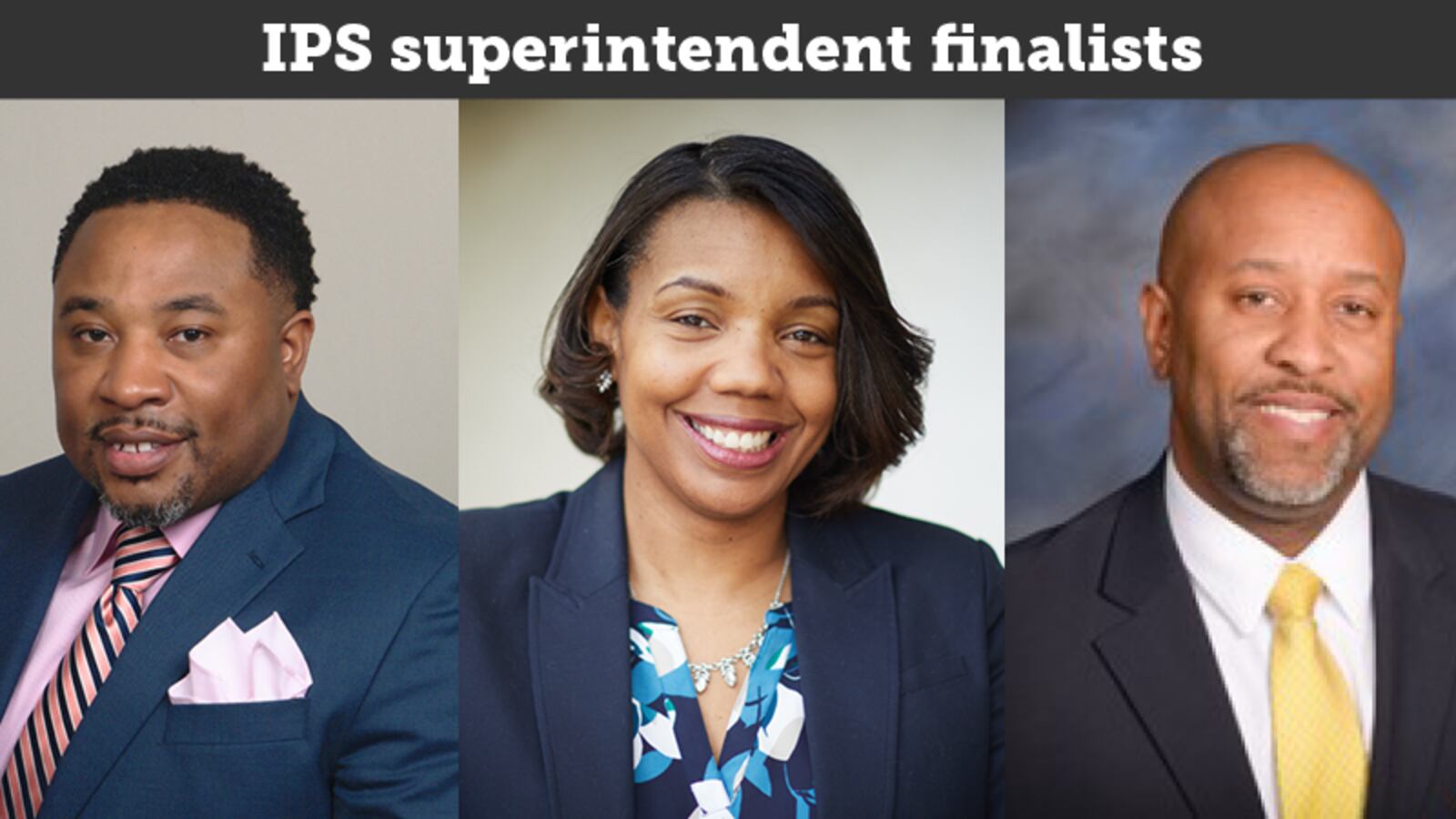Two local school leaders — including interim superintendent Aleesia Johnson — and a Louisville school administrator are finalists to become Indianapolis Public Schools’ next superintendent, the district announced Friday.
Johnson has been seen as a top contender since she took the helm on a temporary basis in January. She was previously a deputy superintendent and helped pioneer the district’s partnerships with charter schools.
Larry Young is the assistant superintendent of elementary education in Pike Township, on the northwest side of Indianapolis. He has worked for Pike Township schools for 21 years, according to his LinkedIn page, including as an elementary school principal and as a teacher.
Devon Horton has been in the midst of state takeover and racial equity debates in Jefferson County Public Schools in Louisville, Kentucky, where he serves as chief of schools. He has also been recognized for his school turnaround work in Illinois. In the last few months, Horton was named as a finalist in two other superintendent searches — in Grand Rapids, Michigan, and Rochester, New York — but ultimately did not win either job.
All three candidates have extensive experience in urban education, but none of them have prior experience leading a school district. All of the finalists are black, which some community members highlighted during the search process as being important since the district is largely made up of students of color.
The finalists will face public interviews at 5 p.m. Tuesday at the central office, 120 E. Walnut St., Indianapolis. The board is accepting written questions from the public and will address common themes in the public interviews.
The board hopes to name a superintendent by the end of June.
The three finalists were chosen from 11 applicants after interviews behind closed doors last month. Despite an avowed desire for an open process, the board ultimately chose to keep applicants secret but release the names of finalists.
Devon Horton

Horton was brought into the newly created role of chief of schools at Jefferson County Public Schools in Louisville a year ago, tasked with overseeing school operations, and guiding and evaluating school principals. He started the job as the district was fending off state takeover, with district leaders touting his arrival and experience with school turnaround.
In his letter of interest for Indianapolis Public Schools superintendent, Horton emphasized his work on closing achievement gaps, highlighting the challenges of both implicit biases and disparities in opportunities.
“As a minority urban school leader, I will be able to connect students and staff across all races through culturally responsive practices through equitable policies and strategic implementation,” Horton wrote, later adding, “Together we can continue to build on the success and become a national model of excellence in equity education.”
In an interview with Chalkbeat, Horton said he would emphasize creating culturally responsive environments and diversifying the teacher pipeline to try to close those gaps. He also wants to build better family and community engagement.
To improve Indianapolis schools, Horton said he would be interested in using the 5Essentials, a model developed in Chicago to support struggling schools by focusing on effective leaders, collaborative teachers, involved families, supportive environment, and ambitious instruction.
Horton’s experience in struggling schools likely intrigues Indianapolis board members, who have been supporting the unconventional method of improving schools by handing them over to outside operators — the district’s innovation school strategy. His letter of interest also touches upon developing highly effective school leaders, which is a key to innovation schools.
In Jefferson County schools, Kentucky’s largest district of 101,000 students nationally known for its integration efforts through extensive busing, Horton said he drives the district’s racial equity policy. The district faces glaring racial disparities in discipline and test scores, with African-American students faring far worse than their white peers.
Roughly half of the schools in the Louisville district have been flagged for improvement by either the state or the district itself. Jefferson County schools is undertaking a new turnaround effort that includes extra pay for teachers at struggling schools.
As the only non-local candidate, Horton will have to address how he’ll adapt his strategies for Indianapolis’ unique challenges, and board members may want to know why he’s been searching for other jobs less than a year into his current post.
Horton told Chalkbeat that his ultimate goal has been to become a superintendent. Working in different cities, he said, has made him a quick study and adept at navigating politics. But if he wins the post in Indianapolis, “I plan on being there for the long-haul, to help the district become a national model — not just in theory, but actually in results,” Horton said.
Earlier this year, Horton was one of two finalists to lead the school district in Grand Rapids, Michigan — but the school board split over whether Horton could lead the 16,000-student district, choosing instead to restart the superintendent search process.
Horton was also one of four finalists in the superintendent search this year in Rochester, New York, and interviewed in 2016 to lead the school district in Benton Harbor, Michigan.
Horton previously worked as deputy superintendent in East St. Louis, Illinois. He spent 14 years in Chicago Public Schools as an educator, leading the turnaround of Wendell Phillips Academy High School. Horton has two school-age children.
Aleesia Johnson

As interim superintendent, Johnson is the first African-American woman to lead the district. She announced her application to be superintendent in April, and she enjoys wide support from local leaders who are enthusiastic about innovation schools.
But her candidacy is controversial. Critics of Ferebee’s administration have raised concerns about her level of experience and her ties to charter schools.
A former principal of the KIPP Indy middle school, a local charter school, Johnson joined the district four years ago to oversee the new innovation schools. Innovation schools are considered part of the district but they are independently managed by charter or non-profit operators. The strategy has attracted national attention to Indianapolis Public Schools.
Through a district spokeswoman, Johnson declined an interview request but said in a statement: “It has been an honor to lead the district the last five months, and I am excited to be a finalist for the permanent role.”
Johnson focused her letter of interest on her district experience, including her work on innovation schools, closing and reconfiguring high schools, and recently giving raises to district employees.
She also honed in on gaps in achievement and opportunities for students of color and students from low-income families: “There is no one who can fix it for us. It is on us. We are the ones we have been looking for, and I believe that solutions already exist among the people who deeply care about our students, our schools and our community.”
Johnson made the challenge personal, talking about the decision to enroll her children in district schools. “As a black woman who is raising black children, it is crushing to know and have real evidence of the ways in which our society — including our educational system — falls short in cultivating the academic growth of black students,” Johnson wrote. “I aspire to lead a district in which parents of color can be confident that their children are attending schools where they feel safe, valued and their growth is cultivated every single day.”
In the public interview, Johnson will likely have to face the criticism against her and address how she’ll work to bridge divides and engage the community. Board members will also likely be interested in how she would further develop the innovation strategy moving forward.
Larry Young

As assistant superintendent, Young oversees Pike Township’s nine elementary schools. Pike Township is a B-rated district that serves 11,000 students, nearly 92% of whom are students of color.
Young is an Indianapolis native whose mother was a longtime Indianapolis Public Schools teacher and father was a graduate of IPS, he wrote in his cover letter — bringing a familiarity of the local education scene that school board members are likely to appreciate.
“It is not only my belief, but it is also my experience that all children can learn and excel at the highest level with the appropriate supports, guidance, and relevant authentic learning experiences,” Young wrote. “Furthermore, I believe it is the responsibility of educators, at all levels, to commit to providing each scholar with a world class education.”
Young was not immediately available for comment.
Throughout his long career at Pike Township, Young has worked as a teacher, elementary school principal, and in various administrative roles, a career ladder that he touted as preparing him to lead a district. Young worked on a district-wide wellness effort focused on healthy nutrition and exercise.
While Pike Township is a smaller district, it also serves a high-poverty population. Indianapolis Public Schools officials will likely be interested in what strategies Young could transfer over.
Still, Pike Township is a more traditionally structured district that loses far fewer students to school choice than Indianapolis Public Schools. School board members could grill Young over what he would do to attract and retain students, whether he is willing to work with charter schools, and how he would lead a district in the national spotlight for its innovation schools.
Read the letters from their applications about why they want to become the next superintendent.

